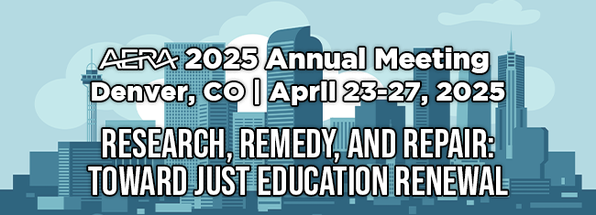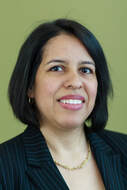AERA DIVISION A NEWSLETTER
Fall 2024
What's New in the Fall Newsletter?
The 2024 Fall Newsletter includes:
The 2024 Fall Newsletter includes:
- A message from our Division A Vice-President, Dr. Detra Johnson
- Exploring the HOW on Integrating Teaching and Research
- A new Scholar Share Blog about what Division A members publications, grants, and projects
- Updates from the Equity, Inclusion, and Action Committee and the Graduate Student Committee.
FALL 2024 Newsletter Features
Vice President's Message

Our Division A Vice-President Dr. Detra Johnson is an Assistant Professor in the Department of Educational Leadership and Policy Studies at the College of Education at University of Houston.
Greetings...Division A Colleagues and Members!
I hope that your semester has been going well and that you are finding your work to be productive, meaningful, and happy.
As we are finalizing the proposal review process for our 2025 AERA Annual Meeting in Denver, I would like to sincerely THANK everyone for submitting your proposals, for reviewing proposals, and for agreeing to facilitate a session or two. Also, I would like to offer a sincere THANK YOU to our Planning Committee Chairs and Members who have done an excellent job organizing the proposal process for the annual meeting. With the over 1,000 proposal submitted to AERA this year, we will have a great meeting engaging in "Research, Remedy, and Repair: Toward Just Educational Renewal". So exciting!
More so, my vision is to continue the work that advances knowledge about education, including spaces for scholars and practitioners, as well as encouraging scholarly inquiry related to education with interdisciplinary perspectives through the dissemination of practical and research approaches.
Looking forward to a great rest of the year and a wonderful start of the new year (Can you believe that the year is almost over?). We still have so much work to do...
See you all at AERA 2025!
Best,
Detra
Greetings...Division A Colleagues and Members!
I hope that your semester has been going well and that you are finding your work to be productive, meaningful, and happy.
As we are finalizing the proposal review process for our 2025 AERA Annual Meeting in Denver, I would like to sincerely THANK everyone for submitting your proposals, for reviewing proposals, and for agreeing to facilitate a session or two. Also, I would like to offer a sincere THANK YOU to our Planning Committee Chairs and Members who have done an excellent job organizing the proposal process for the annual meeting. With the over 1,000 proposal submitted to AERA this year, we will have a great meeting engaging in "Research, Remedy, and Repair: Toward Just Educational Renewal". So exciting!
More so, my vision is to continue the work that advances knowledge about education, including spaces for scholars and practitioners, as well as encouraging scholarly inquiry related to education with interdisciplinary perspectives through the dissemination of practical and research approaches.
Looking forward to a great rest of the year and a wonderful start of the new year (Can you believe that the year is almost over?). We still have so much work to do...
See you all at AERA 2025!
Best,
Detra
Exploring the How on
Integrating Teaching and Research

The Division A Newsletter Team connected with some of our colleagues to unpack what integrating teaching and research means to them and how they address it through their work. We will continue to share these through social media and newsletters in the coming months. For this first insight, here is what Drs. Jada Phelps and Elizabeth Gil had to share in response to our question: What strategies do you use to integrate your teaching and research?
From Dr. Jada Phelps, Assistant Professor, Michigan State University
In my courses Engaging Diverse Students, Families, and Communities (EDSFC) and The Principalship, I strive to prepare aspiring principals to lead schools that actively disrupt and dismantle systems of oppression, particularly in their engagement with historically marginalized communities.
In EDSFC, we focus on how deficit ideologies, othering, and colonizing practices have systematically alienated groups such as BIPOC, newcomers, LGBTQIA individuals, and girls and women. I encourage my students to examine how schools perpetuate these exclusions and challenge them to facilitate difficult conversations with their peers on issues like racism, sexism, classism, and xenophobia. These conversations are designed to help students reflect critically on their own biases and develop a deeper understanding of how oppression manifests in education. I provide guiding protocols to help structure these dialogues and ensure that students engage in meaningful self-reflection.
A key part of this course involves students creating long- and short-term action plans to address the needs of marginalized students in their future schools. Additionally, they conduct group literature reviews to delve deeper into the issues faced by these communities and present their findings on how to address these challenges. One of the most powerful activities in the course is the creation of asset maps, which draw on Yosso’s (2005) cultural community wealth framework and Green’s (2008) geography of opportunity. These maps allow students to identify the existing wealth and opportunities within marginalized communities, challenging deficit perspectives and reinforcing the strengths that these communities bring to schools.
In The Principalship, I focus on equipping students with practical tools for their first years as building-level leaders in P-12 schools. I incorporate simulations that allow students to practice critical decision-making in real-world scenarios without the risk of failure, giving them hands-on experience in navigating the complexities of school leadership. We also work on developing their leadership platforms, guiding students to clarify their vision and mission for the schools they will lead, with a strong emphasis on dismantling oppressive systems and fostering environments that affirm all students.
One of the most important components of this course is the integration of High leverage strategies for school improvement (Supovitz), and Khalifa’s et. al, culturally responsive and decolonizing school leadership. I emphasize the importance of these three frameworks, helping students understand how to lead in ways in evidence based ways (high leverage) that also affirm and uplift marginalized students and families. This includes examining how colonial and deficit mindsets often shape school policies and practices. Additionally, students develop 100-day leadership action plans that integrate their leadership vision, high leverage strategies and extract from Khalifia et al's frameworks. By combining research-based frameworks like Yosso’s cultural community wealth, Green’s geography of opportunity, Supovitz's high leverage strategies, and Khalifa’s culturally responsive and decolonizing leadership, I aim to create a learning environment where aspiring principals are equipped not only with the theoretical knowledge but also with the practical strategies to dismantle systems of oppression and create school environments that are responsive to the needs of all students.
From Dr. Jada Phelps, Assistant Professor, Michigan State University
In my courses Engaging Diverse Students, Families, and Communities (EDSFC) and The Principalship, I strive to prepare aspiring principals to lead schools that actively disrupt and dismantle systems of oppression, particularly in their engagement with historically marginalized communities.
In EDSFC, we focus on how deficit ideologies, othering, and colonizing practices have systematically alienated groups such as BIPOC, newcomers, LGBTQIA individuals, and girls and women. I encourage my students to examine how schools perpetuate these exclusions and challenge them to facilitate difficult conversations with their peers on issues like racism, sexism, classism, and xenophobia. These conversations are designed to help students reflect critically on their own biases and develop a deeper understanding of how oppression manifests in education. I provide guiding protocols to help structure these dialogues and ensure that students engage in meaningful self-reflection.
A key part of this course involves students creating long- and short-term action plans to address the needs of marginalized students in their future schools. Additionally, they conduct group literature reviews to delve deeper into the issues faced by these communities and present their findings on how to address these challenges. One of the most powerful activities in the course is the creation of asset maps, which draw on Yosso’s (2005) cultural community wealth framework and Green’s (2008) geography of opportunity. These maps allow students to identify the existing wealth and opportunities within marginalized communities, challenging deficit perspectives and reinforcing the strengths that these communities bring to schools.
In The Principalship, I focus on equipping students with practical tools for their first years as building-level leaders in P-12 schools. I incorporate simulations that allow students to practice critical decision-making in real-world scenarios without the risk of failure, giving them hands-on experience in navigating the complexities of school leadership. We also work on developing their leadership platforms, guiding students to clarify their vision and mission for the schools they will lead, with a strong emphasis on dismantling oppressive systems and fostering environments that affirm all students.
One of the most important components of this course is the integration of High leverage strategies for school improvement (Supovitz), and Khalifa’s et. al, culturally responsive and decolonizing school leadership. I emphasize the importance of these three frameworks, helping students understand how to lead in ways in evidence based ways (high leverage) that also affirm and uplift marginalized students and families. This includes examining how colonial and deficit mindsets often shape school policies and practices. Additionally, students develop 100-day leadership action plans that integrate their leadership vision, high leverage strategies and extract from Khalifia et al's frameworks. By combining research-based frameworks like Yosso’s cultural community wealth, Green’s geography of opportunity, Supovitz's high leverage strategies, and Khalifa’s culturally responsive and decolonizing leadership, I aim to create a learning environment where aspiring principals are equipped not only with the theoretical knowledge but also with the practical strategies to dismantle systems of oppression and create school environments that are responsive to the needs of all students.

From Dr. Elizabeth Gil, Associate Professor, Fordham University
One of the ways I have integrated teaching and research has been to study how completing a community assets project in a school-based leadership master's degree course, Partnering with Families and Communities, has impacted graduate students’ ideas about family and community engagement and their own practice as leaders. This research has also helped me to have a greater understanding of what aspects of the course and our master’s program have influenced our students the most and have helped them best prepare for their current and future roles in schools. This information, then helps us to know what may be the most effective approaches and useful content to build on and where we might improve our leadership program.
One of the ways I have integrated teaching and research has been to study how completing a community assets project in a school-based leadership master's degree course, Partnering with Families and Communities, has impacted graduate students’ ideas about family and community engagement and their own practice as leaders. This research has also helped me to have a greater understanding of what aspects of the course and our master’s program have influenced our students the most and have helped them best prepare for their current and future roles in schools. This information, then helps us to know what may be the most effective approaches and useful content to build on and where we might improve our leadership program.
LOOKING AHEAD: The 2025 AERA ANNUAL MEETING

The 2025 AERA Annual Meeting theme--“Research, Remedy, and Repair: Toward Just Education Renewal”—“calls us to consider how we can work across disciplinary, epistemological, and methodological orientations to forge deeper connections in our field that can speak to the challenges we face in education and in our imperfect multiracial democracy.”
Division A members, graduate students, and colleagues are encouraged to submit proposals to present their work at the 2025 AERA Annual Meeting.
Division A member proposals and reviews
in the following areas:
Division A members, graduate students, and colleagues are encouraged to submit proposals to present their work at the 2025 AERA Annual Meeting.
Division A member proposals and reviews
in the following areas:
- Section 1. Leadership
- Section 2. School Organization and Effects
- Section 3. School and District Improvement
- Section 4. School Contexts and Communities
- Section 5. Leadership Preparation Development
Scholar Share

The Fall 2024 edition of Scholar Share highlights member publications, projects, and grants.
About Scholar Share: The Division A Scholar Share is intended to highlight new, exciting, and important scholarly endeavors and provide critical insights into relevant topics in the field of educational leadership. Scholar Share offers Division A members opportunities to engage in ongoing learning, professional development, and to connect with other scholars and practitioners in the field. We invite you to share one project, research grant, leadership initiative, publication, and/or other important scholar-practitioner endeavor with Division A members. Please use this link if you would like us to post your work!
About Scholar Share: The Division A Scholar Share is intended to highlight new, exciting, and important scholarly endeavors and provide critical insights into relevant topics in the field of educational leadership. Scholar Share offers Division A members opportunities to engage in ongoing learning, professional development, and to connect with other scholars and practitioners in the field. We invite you to share one project, research grant, leadership initiative, publication, and/or other important scholar-practitioner endeavor with Division A members. Please use this link if you would like us to post your work!
Equity, Inclusion & Action Committee Update
The Division A Equity, Inclusion & Action (EIA) committee has been actively working to bring a series of initiatives to fruition. They are excited to invite you to join them at two special AERA sessions that were collaboratively developed and organized by the committee, the Division A Business meeting, and the fourth Literature in Action series.
Click here to read the details of their work through the EIA blog.
Click here to read the details of their work through the EIA blog.
Graduate Student Committee Update
As we prepare for the 2025 AERA Annual Meeting, we would like to encourage graduate students to follow @AERA_grads and @DivisionAGSC on Twitter, as well as any other SIGs or divisions they belong to, for up-to-date information about planning for the meeting, special receptions, and other gatherings.
Division A Officers
Click here for more information about the Division A Officers.
Check out more about the Program Committee Section Chairs and Equity, Inclusion, & Action Committee members
Check out more about the Program Committee Section Chairs and Equity, Inclusion, & Action Committee members
NEWSLETTER EDITORIAL TEAM
Greetings, Division A! It's our honor to serve as the 2024-25 Division A Newsletter editorial team. We welcome Drs. Meagan S. Richard from Old Dominion University and Alison Wilson from University of Houston as our Associate Editors.
Drs. Elizabeth Gil and Jennifer Watters are the Co-Editors of the Newsletter.
We welcome your feedback, input, and ideas! We invite all viewers to share our community newsletter widely! If you have announcements or updates, please email them to our Co-Editors to be featured in our next newsletter.
To learn more about the Division A Newsletter editors, click here.
Drs. Elizabeth Gil and Jennifer Watters are the Co-Editors of the Newsletter.
We welcome your feedback, input, and ideas! We invite all viewers to share our community newsletter widely! If you have announcements or updates, please email them to our Co-Editors to be featured in our next newsletter.
To learn more about the Division A Newsletter editors, click here.
|
|



